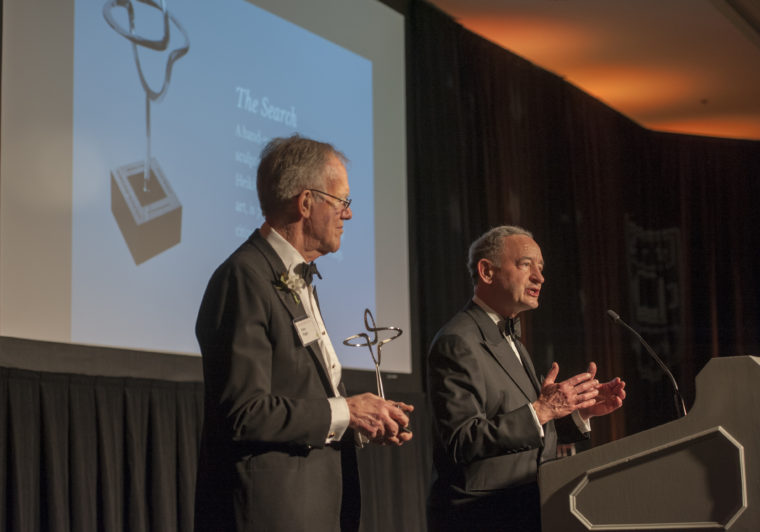April 5 was a special night for members of Washington University’s William Greenleaf Eliot Society, for it marked a half-century of dedicated alumni, friends and parents coming together and giving their valuable time and resources to accelerate the institution’s ascendancy among the world’s finest universities.
Members gather each year to celebrate the university’s accomplishments and to acknowledge the contributions made by Eliot Society members. The organization’s current membership stands at 9,800.
In her opening remarks, Eliot Society President Merry Mosbacher noted its impressive impact:
“Year after year, our members have led the way in annual giving for Washington University. Our gifts help support scholarships, faculty recruitment and retention, innovative research and outstanding academic programs.”
Mosbacher noted that last year’s Eliot Society contributions totaled nearly $21 million in gifts and pledges.
Mosbacher introduced Chancellor Mark S. Wrighton, who showed his gratitude for their hard work and lasting contributions:
“As members of the Eliot Society, you help our talented students develop the intellect and character that last a lifetime. With your support, we challenge our students to reach further, to change themselves and their world for the better, to give back in countless ways.”
A hallmark of the annual celebration is to honor a member whose outstanding contributions have advanced excellence in teaching, research and service to society with the Eliot Society’s highest honor, the Search Award. This year, the honor went to John H. Biggs.
“John’s extraordinary contributions to Washington University have spanned several decades and have made an impact throughout the institution,” Wrighton said.
Biggs, an eminent economist, philanthropist and longtime trustee of Washington University, has been instrumental in helping advance the institutional mission through a variety of roles and across several decades.
After graduating from Harvard University, where he earned a degree in classics, Biggs returned to his native St. Louis and joined the General American Life Insurance Co. He switched to academia when an offer came from then-Chancellor William H. Danforth to serve as Washington University’s vice chancellor for administration and finance. Many of the significant financial and investment improvements made during this time are attributable to his leadership.
Biggs served in this capacity until 1983, when he joined Centerre Trust Co. as chief executive officer. In 1989, he moved to New York, becoming president of TIAA-CREF; he retired in 2002 as its chairman and chief executive officer. With retirement came the opportunity to teach finance at New York University’s Stern Business School.
Throughout his career, Biggs continued his close association with Washington University. As a trustee, he has contributed his time and knowledge to the management of Washington University’s investment endowment and other funds. Currently, he serves on the Educational Policy Committee.
While working here, Biggs earned a doctorate in economics. With his wife, Penelope, who also earned a doctorate from Washington University, in comparative literature, they established endowments for a distinguished professorship as well as an annual lectureship in classics.
Biggs has served on the boards, and as chair, of a number of major corporations as well as the NYC United Way, the NASD, the Getty Trust Board, the National Bureau of Economic Research and the Danforth Foundation.
In addition, Biggs has lent his financial expertise to several accounting oversight boards, including the Financial Accounting Standards Board and another that strongly influenced the Sarbanes-Oxley Act.
Among his professional associations are memberships in the American Academy of Arts and Sciences and the Council on Foreign Policy, and he is listed in the National Association of Corporate Directors Hall of Fame.
In St. Louis, Biggs was a founding trustee of the New City School.
John and Penelope’s son, Henry, has been a member of Washington University’s faculty, and has served in various administrative capacities for many years; currently he is an adjunct professor in the School of Law, where he earned his law degree, as well as in Arts & Sciences.
The evening was topped off by a robust presentation from Neil deGrasse Tyson, world-renowned astrophysicist and champion of science literacy.
